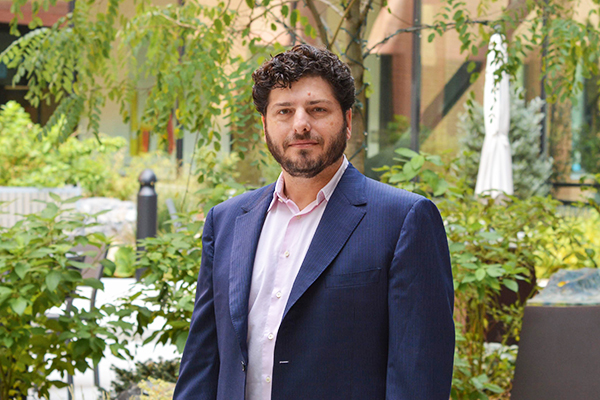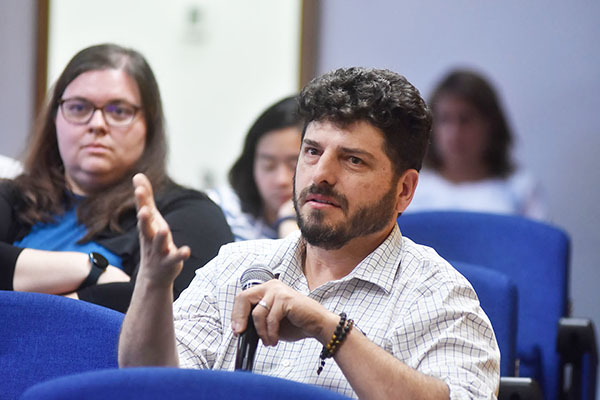ITLS Professor David Feldon Receives a Fulbright Scholar Award

David Feldon, recipient of the Fulbright Scholar Award
David Feldon, professor in the Department of Instructional Technology and Learning Sciences in the Emma Eccles Jones College of Education and Human Services (CEHS) and former CEHS associate dean of graduate studies, has been awarded a prestigious Fulbright Scholar Award. Established in 1946, the Fulbright Program enables accomplished scholars to study, teach, conduct research, exchange ideas, and contribute to mutual understanding in over 160 countries. Fulbright awardees are chosen for their academic merit and leadership potential.
“We are proud of Professor Feldon’s scholarly accomplishments and this opportunity for him to expand his impact as a Fulbright Scholar,” said Al Smith, Emma Eccles Jones endowed dean of CEHS.
Feldon will travel to Australia in January 2025 as part of the international educational exchange program. Every year, more than 800 U.S. scholars teach or conduct research overseas through the Fulbright U.S. Scholar Program. Fulbrighters engage in cutting-edge research and expand their professional networks, often continuing research collaborations started abroad and laying the groundwork for future partnerships between institutions.
Feldon’s research aims to better understand how participation in an oral dissertation defense impacts students and how they might best prepare for it. Because the practice of an oral defense is relatively new in Australia, Feldon will delve deep into the nuances of Australia’s academic culture for the three months he will spend at the University of Newcastle.
Studying the cultural phenomena of the oral defense in Australia will be particularly insightful for Feldon’s research. “In the United States, we have a long-standing tradition of an oral dissertation defense,” says Feldon. “We have a highly developed cultural model of what it means to defend a dissertation, and that awareness shapes how we prepare for it.”
He continues: “Australia is unusual. Over the last ten years they’ve gone from oral defenses never happening to about 50 percent of Ph.D. students doing an oral defense. Researching Ph.D. training in Australia—where that context is changing—will allow me to understand how scholars are preparing for their oral dissertation, how they are developing skills, and how well they do based on different experiences they’ve had. There isn’t a homogenous experience of what it means to do this in Australia.”

Feldon participates in a discussion at the International Cognitive Load Theory Conference.
Feldon is primarily interested in examining the cultural aspects of preparing for the defense. “I seek to understand how skills develop in a way that is separate from unspoken cultural expectations. And when I say cultural, I don’t necessarily mean ethnicity or religion. Every academic discipline has its own culture. For instance, when we say, ‘making an argument,’ what does that mean? When we say, ‘you’ve proved your point,’ what does that mean? When we say, ‘you’ve done good enough work to get a Ph.D.,’ what does that mean?”
When applying for the Fulbright award, Feldon actively sought out Australia, and particularly the University of Newcastle, as his destination of choice. “I have colleagues who work in doctoral education at the University of Newcastle who are looking at it right now, but they are looking at it from an Australian perspective, not an American perspective. I want to go over and work with them.”
In his collaborative research at Newcastle, Feldon will gather data that will give him a better perspective. “This is what a Fulbright is all about. You go somewhere else, and you work on understanding a culture that is different from your own. I’m going to experience it and observe it. I’m going to collect and analyze the data to get a sense of where skills are being very effectively developed and where skills are not being as well developed.”
In addition to researching with and learning from his colleagues at Newcastle, Feldon will work extensively with a diverse group of students: aboriginal, international, as well as Australians of European descent. “I expect to see some differences in the norms of discourse and interactions as people from different backgrounds engage in the doctoral education process.”
“My goal is to learn how doctoral education is done in different contexts and with different populations,” says Feldon. “I want to represent U.S. scholarship in this area. The Fulbright is an exchange program with the purpose of helping to build mutual understanding and shared perspectives, and I am honored to participate.”
Feldon was recently appointed associate vice provost for graduate studies in the School of Graduate Studies at USU. In this role, he will support graduate education and research by promoting academic excellence and fostering an innovative culture of graduate education.

